The Rise and Fall of EA Sports Big, as Told by the Creator of SSX
After the success of SSX, other likeminded extreme sports games like Cranked failed to come to fruition.
This article first appeared on USgamer, a partner publication of VG247. Some content, such as this article, has been migrated to VG247 for posterity after USgamer's closure - but it has not been edited or further vetted by the VG247 team.
From defying the laws of physics as a freestyle skier, to inventing an Olympic sport and creating EA Sports Big, a brand that would stick in the collective memory of a whole generation of gamers, nobody else can boast the same unbelievable career trajectory as Steven Rechtschaffner.
"It was really opportunistic timing," he tells me about his career. But there’s much more to the man who brought us franchises like the snowboarding series SSX and the basketball series NBA Street that helped reinvigorate the action-arcade genre. He introduced a whole generation to new experiences filled with amazing music, breakneck pace, and sheer unmatched energy. Those hooked on Big's brand of adrenaline pumping gameplay have yet to find a substitute.
Rechtschaffner’s story starts with a young boy strapping skis to his feet for the first time. Thousands of hours of hard work in the ski boots later, the first of his multiple distinct careers took off and was about to transform every aspect of his life.
"I was a freestyle skier in the early years of the World Cup freestyle skiing circuit and I met my wife there. I was on the U.S. team and she was on the Canadian team," Rechtschaffner tells me from his wife's hometown of Vancouver.
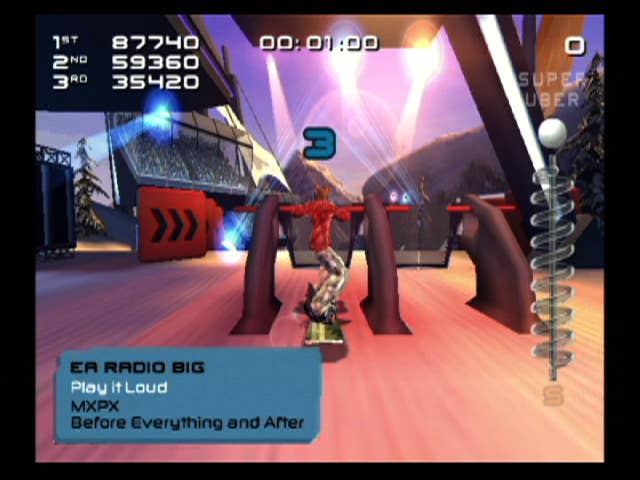
His career on the U.S. Freestyle Ski Team ended in 1981 after four years of competing in the World Cup series. But where many retired athletes struggle to find their next calling, Rechtschaffner jumped right into the next challenge. He became the first Program Director for his former team in hopes of paving the road for the freestyle skiing to become an Olympic event.
That decisiveness in carving his career path fits my first impressions of Rechtschaffner. He rarely hesitates or takes more than a few seconds to recall an event from 20 or 30 years ago. He doesn't beat around the bush and talks fast in a strong, yet friendly voice. He’s probably too busy for it, but you'd want Rechtschaffner as your skiing instructor. He gets excited every time I mention a personal connection to the games he worked on, like the fact that SSX Tricky was the first game I picked up for my PlayStation 2.
Introducing a new Olympic discipline, as it turned out, was a long and painstaking process. Freestyle skiing made its official debut in the 1992 Albertville Winter Olympics, long after Rechtschaffner switched careers yet again in 1983.
"About three years before I went to work for Electronic Arts [in 1991] I was producing segments of a TV show featuring action sports [Greg Stump’s World of Extremes for Fox TV]," says Rechtschaffner on the birth of the Olympic discipline. "My partner Greg Stump, who was making ski movies, and I kind of ran out of ideas. We had seven segments we had shot and we needed one more. I've had this idea: it was kind of like motocross and I initially thought about it with skiers but it worked better with snowboarders. I spent two days with a Caterpillar [snowplow] driver trying to figure out how to make banked turns out of snow and building double jumps, At the end of it we had a course and we put on what became the very first Boardercross event. We named it Boardercross and, as you may or may not know, it's an Olympic event now. And it was also obviously hugely influential in creating SSX."
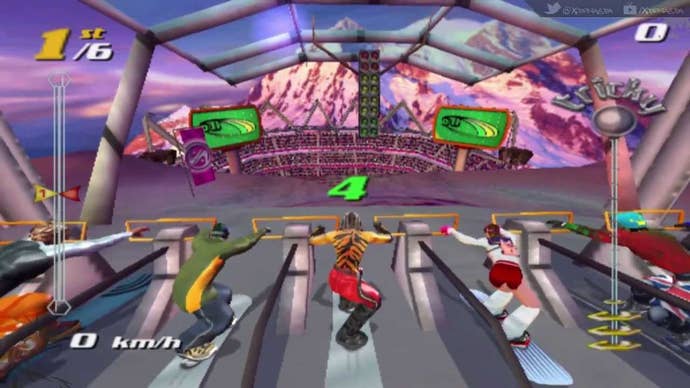
Long before that, it was 1983, the time before both Boardercross and SSX. After pulling out of the U.S. Ski Team altogether, Rechtschaffner paved a new avenue for himself.
"I moved to New York when my wife stopped competing and I got a job with a new [watch] company that was relaunching itself called Swatch. I spent the next 6 years building that brand," Rechtschaffner says. "We were one of the first brands working with hip-hop and action sports. We were kind of creating the original playbook of what a lot of companies like Red Bull are doing today at a much, much greater scale."
That same playbook would also come in handy later in his life when pitching SSX to the higher-ups at Electronic Arts. But before that happened, Rechtschaffner's career had to take yet another turn. A newly formed interest in film and television production prompted him to move to Los Angeles. With plenty of experience directing commercials and videos for Swatch, Rechtschaffner had no problems in landing high profile clients.
One of them happened to be SEGA in the early stages of the marketing campaign for their third console, the 16-bit Genesis. Working with SEGA, Rechtschaffner took notice of the fast-growing gaming business and wanted in on the fun. "I really liked playing their games and I've always liked arcade games," he remembers. "Then my wife wanted to move home to Vancouver, where she came from." In an effort to facilitate the move to Canada, Rechtschaffner linked up with the president of what had just become Electronic Arts Canada and after presenting his ideas to make games "more broadly appealing," landed a job as a producer. Getting in on the ground floor meant joining a small group of about 70 talented people and being the right man in the right place at a very opportune time.
"I had a directing background just as things were starting to move to 3D, so I got involved and helped figure out the 3D sports games," Rechtschaffner says about his work on the early FIFA games. "I was kind of the only one there who understood cameras and camera logic and how to tell a story when you can actually move cameras. It was a really opportunistic timing."
"My approach to [creating a snowboarding engine] was trying to build it at an arcade or Nintendo-level quality, and really making it about fun, not about being a simulation."
As the importance of 3D graphics grew, so did Rechtschaffner's role at Electronic Arts. While EA was making basketball, hockey and soccer games, Rechtschaffner noticed a glaring empty slot in the company’s portfolio: the lack of a baseball franchise. With the blessing of his higher-ups, he started the successful Triple Play Baseball series, thus proving himself to be an invaluable asset. “From there I got the opportunity to start spending a little time on the side on passion projects." he says. And he knew right away how to seize that opportunity.
"Having always been involved with action sports as an interest, I worked with skateboarders, snowboarders in the past, been a skier, I just loved that sort of thing and thought it was underserved in the game space," says Rechtschaffner. "I started working on building an engine that could create a convincing snowboard experience. My approach to the whole thing was trying to build it at an arcade or Nintendo-level quality, and really making it about fun, not about being a simulation. But having great physics and control, things that anybody could pick up and play but it would be hard to really master the game."
SSX started life as a Dreamcast game, in the time before the PlayStation 2 was fully announced. However, when EA decided to end their long running relationship with SEGA over dubious hardware decisions (the choice of the CPU powering Dreamcast) and a proposed new licensing deal (less money from sold games going to EA), the development was switched to Sony’s flagship console of the time. According to Rechtschaffner the shift worked out well for SSX as SEGA's console wouldn't have had the same rendering ability as the PlayStation 2.
“The folks at Sony were pretty blown away,” Rechtschaffner says. The game looked in fact so promising that Sony offered help and access to their engineers, if Rechtschaffner and the team promised to include SSX in the PS2’s launch roster.
And yet, not everyone back at Electronic Arts shared Sony's enthusiasm for the project.
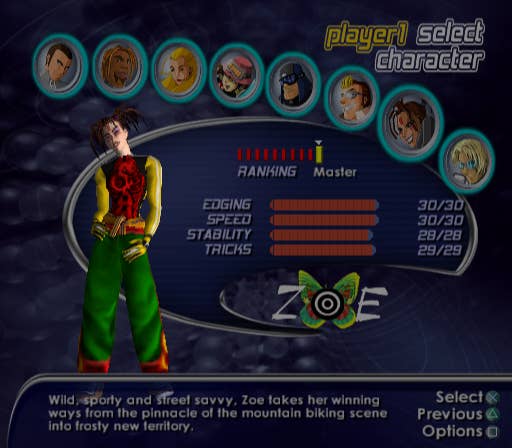
"Early on as we were struggling with it, more than a few times people suggested I might just call it a day," says Rechtschaffner, remembering the atmosphere of uncertainty at the studio. "But EA had a concept called 'earning silver bullet:' if you built a game that was successful, you earned a silver bullet, which meant you could build an idea forward. You had an opportunity to try something, even if you were to fail, as long as you were building on top of a success."
SSX, of course, wasn't meant to fail and when the game started taking its final shape, the naysayers were proven wrong.
"Once people saw and played SSX in the near-final state, they realized there had never been a game like it made by EA," says Rechtschaffner. "I think people were blown away by the quality of the gameplay, the visuals, the pace of it, and the fun factor. It was also at a time when most of [EA's] games had kinda been below the mark on the quality level. I think the average rating of a game back then was around 74, and although the game hadn't yet got rated, people could see that SSX was of higher quality."
But where the rest of EA saw just a great game, Rechtschaffner saw an opportunity to start something much bigger than a single franchise: a new label within EA Sports that would serve as an umbrella for more experimental titles. His unusual career proved instrumental in pulling that plan off.
"I had a background in marketing and branding [from Swatch,] and I said: 'Let's use it, let's create a new brand that connects to sports but clearly differentiates it.' That was how we came up with the idea of EA Sports Big and literally pulled that together in a matter of a couple of weeks to launch along with the game."
Despite the rush, the EA Sports Big label was off to a great start, carried by arguably the best game in the PS2's launch catalog. SSX boasts a Metacritic rating of 93, making it the 19th best-reviewed game on PS2 and one of the highest rated games in the history of EA. That placed SSX in a stark contrast to the mediocre games the company was churning out at the time.
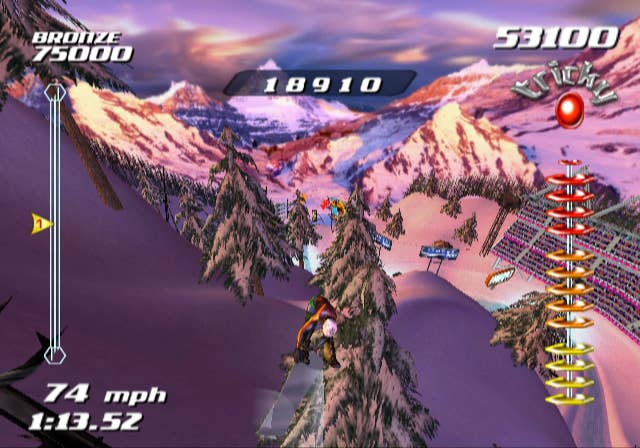
"You could see that there was an opportunity for more accessible, more action-arcade style sports games. [We had] a different appeal than the traditional EA Sports games," says Rechtschaffner. "So people got on board. Maybe they even got on board too much."
The age-old adage claims that success has many fathers. This success, however, had many children.
"Other executive producers in other EA studios started creating ideas for EA Sports Big games. While I didn't have the authority or the responsibility to really run them I was basically told to be sort of be the godfather of Big," says Rechtschaffner. "It's always hard to do something when you have no accountability or authority and just influence."
Rechtschaffner recalls having no accountability or authority, but only influence over the games released under the umbrella EA Sports Big. And that put him in a delicate position.
"I could see that some of the games were looking really cool, but they hadn't figured out the physics and the gameplay,” he says. “And so people got excited when they got shown a demo video. They went 'that's great, let's commit, let's do it' but I could see it wasn't actually fun yet and didn't feel right yet. The problem was people would start building a game before they really had the core of it really nailed. So that happened in a couple of games."
Among them was Freekstyle, a freestyle motorcycle game made by Page 44 Studios. "It was a really cool concept. They did amazing rendered videos of the world and their courses," Rechtschaffner says. "I just think got ahead of themselves and started building out all the content before they really defined the fine touches of the game."
Reviewers noticed that as well. Released in 2002, Freekstyle averaged a score of 81/100. Not bad by any measure, but far from the mark set by other EA Sports Big titles of the time. NBA Street 2 for example, executive produced by none other than Rechtschaffner, released a year later to universal acclaim and an average score of 90. That meant that Rechtschaffner earned himself yet another silver bullet. He knew exactly how to cash it.
"You could see that there was an opportunity for more accessible, more action-arcade style sports games."
A passionate mountain biker, Rechtschaffner wanted to build a game that would do the sport justice and challenge the dominion of Downhill Domination which was and still is essentially the only notable game about biking downhill. He tasked designer Ian Verchere with working out a couple of prototypes for a game called Cranked. First of them followed the path carved by SSX, that of a straightforward, fast-paced race downhill. The other veered well off it.
"It was really out of the box and interesting," says Rechtschaffner. "It was almost like a platformer, not dissimilar to what Trials HD came out as a number of years later. But Trials HD was about balancing and this was much more focused on an over the top world, and on the discovery, and on trying to find your way through."
The development team behind SSX, which through the years grew to almost a hundred people, was slated to turn Cranked into another EA Sports Big smash hit. But when the time came to start full-fledged production on Cranked, the core of the game wasn't fleshed out well enough to justify delegating an entire studio to work. “You have all the people that need to build stuff, but they're building on top of a foundation that's not quite set yet,” Rechtschaffner says. Even back then, EA was too much of a well-oiled business machine to take a major risk on Cranked. The game was postponed indefinitely and eventually, much to Rechtschaffner’s dismay, scrapped altogether.
Cranked wasn't the only game Rechtschaffner and his team wanted to make but couldn't.
"Our team really wanted FIFA Street. We were passionate about it. A bunch of people on the team worked on FIFA before and wanted to have fun with the gameplay," says Rechtschaffner. "But that was back when within EA Canada there were three big factions and each faction owned different businesses and franchises. [And] we didn't own the soccer business, so even though we wanted to do it, we couldn't get the opportunity to do it. Another team did get to it, maybe a year or two later. It was a bit different than [what] we would have done [with] it at the time, but I think it was still successful."
FIFA Street was released in 2005 and was indeed successful. It was successful enough to warrant two sequels and a disappointing 2012 reboot, but it was nowhere near as much fun as the NBA Street series that came before it. That dip in quality was symptomatic of the performance of the entire EA Sports Big label in the mid-00s.
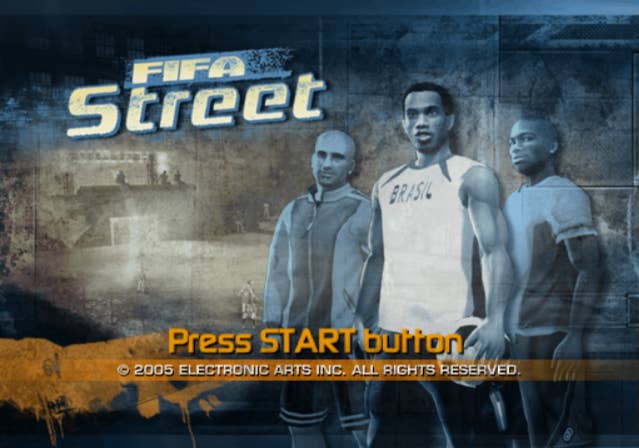
SSX 3 and NBA Street Vol. 2 were Rechtschaffner’s last EA Sports Big titles as executive producer. His next job at EA required more of a global approach to the creative direction the company was taking at the time and less involvement in any specific titles. "That for me was the end of it," he says. "I think it started to dissipate over time, and rather than the brand getting more focused, it got little less focused and I think eventually just kinda disappeared."
And that's about the long and the short of it. EA Sports Big fizzled out among increasingly mediocre sequels, like the uninspired iterations of the not so great to begin NFL Street series and SSX sequels that struggled to capture the spirit of the original trilogy after Rechtschaffner’s departure, until the label was replaced altogether by EA Sports Freestyle in 2008. The new name doesn’t ring a bell? That’s because only three games were ever released under its umbrella before EA gave up on it.
I ask Rechtschaffner what caused EA Sports Big’s downfall and his eventual exit from the company, hinting at, perhaps, EA's policy shift from about a decade ago.
"Certainly EA taking a conservative approach played a part," he tells me. John Riccitiello's promotion to the position of the CEO of EA in 2007, along with the advent of the financial crisis a year later brought huge changes to the way the company operated. EA laid off 11 percent of its workforce, shut down 12 of its facilities, and moved towards a risk-averse business model. Gone were the days of taking risks on experimental projects and trusting the producer's instincts.
"The approval process that had developed, the silver bullet thing, no longer existed. Instead, we had an approval process that involved a lot of salespeople, marketing people and not so many game makers,” Rechtschaffner says. “I think it shifted to become much more marketing focused, much more new feature focused for a number of years. And I think that hurt big franchises like FIFA where the gameplay kinda got stagnant even though there were all those marketable features. It left them vulnerable to competition."
With the days of making games long behind him (these days he spends his time coaching and advising businesses), Rechtschaffner can comfortably look back on the gaming industry and diagnose what went wrong for the action-arcade genre.
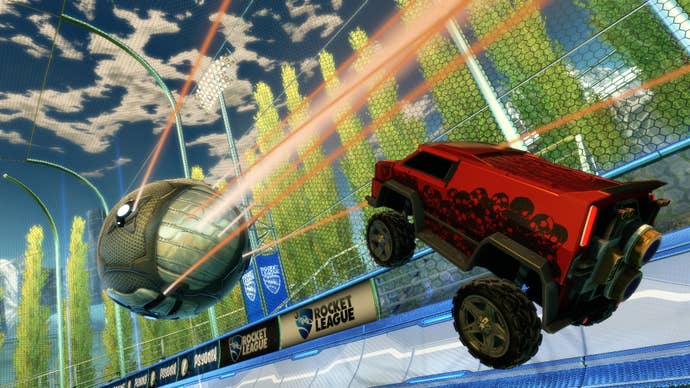
"I grew up on arcade games. Back then you'd put a quarter in and if you didn't feel that visceral energy and didn't think you could beat it, you wouldn't put another quarter in and that game was a failure," says Rechtschaffner, lamenting that most games of today take another approach to captivating players. "I miss action-arcade titles and I think the reason they kind of disappeared is for the most part because there haven't been any good ones."
Apart from Rocket League, that is. Rechtschaffner singles out the soccer-but-with-cars game as the one modern action-arcade title worthy of comparisons to the genre's classics that came before it. "It's kind of like making pop music," he says, citing the secret to making a game as challenging and empowering as Rocket League. "You have to bring a lot of elements together. Lots and lots of people can make a song and call it a pop song but it's something completely different when it becomes a hit on the radio, and people are humming it."
As our chat about the past of action-arcade sports games is coming to an end, I ask Steven Rechtschaffner about the future of the genre. Could they ever become popular again propelled perhaps by the Rocket League’s immense success?
"I do think there's something interesting on the horizon. I think there will be an opportunity to lower the barriers to entry to what I guess we today call console gaming."
And that could, potentially and hopefully, revive the almost forgotten genre of the action-arcade extreme sports games. Even if that shift won't reunite Rechtschaffner with making games, this chat gave him an excuse to revisit his past career. To prepare for the interview with me, he dusted off his old copies of the SSX games and played them for the first time in a decade.
"They're still fun,” he says.
